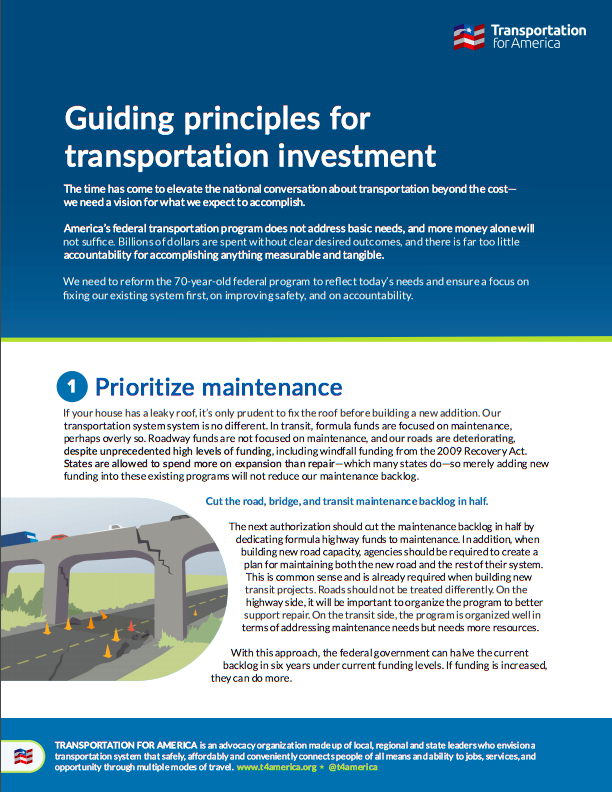Summary of the American Recovery and Reinvestment Act
For those of you who don’t check the “Campaign News” tab at top on a regular basis or get the full RSS feed, we posted our full summary of The American Recovery and Reinvestment Act of 2009. If you are interested in the full, detailed, numerical breakdown of transportation spending in the stimulus package, read Transportation For America’s full summary of the provisions and funding requirements for transportation in The American Recovery and Reinvestment Act.
Though a Worthy Down Payment, Stimulus Raises Urgent Need for New Transportation Vision
Given the need for haste in crafting the bill, congressional and Administration negotiators were handcuffed by backward-looking, existing programs even as they tried to shape investments for a future of reduced oil dependency, greater opportunity for Americans to join the middle class and cleaner transportation choices. Despite some shortcomings resulting from current transportation law, Congress has adopted a bill that if properly enacted by state and local authorities, could be a down payment on a new direction for America’s infrastructure.
Transportation numbers emerge on the stimulus
UPDATE (2:00 p.m., 02/12/09): Talking Points Memo has acquired a summary of the new bill, which includes a comparison of each spending item to the House and Senate legislation. It looks like the final number for highways is $27.5 billion. The bill to come out of conference also includes $1.3 billion for Amtrak. — We […]
BREAKING: House-Senate compromise on stimulus
A number of news outlets are reporting that a group of Senate and House members have come to a tentative agreement on the stimulus, paving the way for the final passage of the bill. The small conference of legislators have reportedly negotiated a $789.5 billion stimulus — a sum that’s about $30 billion less than […]
Comparing transportation spending in the Senate and House stimulus
With the stimulus successfully passed through the Senate, it moves into conference with the House, where the two chambers will try to hammer out the version to be voted on again by each house before heading to the President’s desk if it passes. Here is our side-by-side comparison on the transportation spending in the two versions.
Senate compromise preserves transit funding — for now
It appears the Senate compromise on the stimulus package keeps transit and highway funding unchanged. We’re suspending our appeal to make calls for now. The Senate will move to vote on the overall stimulus package Monday or Tuesday. Then it moves to a conference committee with the House to determine the balance between the two bills that will ultimately be voted on by both Chambers and sent to the President’s desk.
BREAKING: Threat to transit funding in Senate compromise?
The so-called “compromise” plan about to be put forth by Senators Nelson and Collins would cut somewhere between $80-100 billion from the Senate stimulus package. In part, by cutting transit’s already paltry amount nearly in half, and raising the amount of highway spending by an undisclosed amount. Call your Senator now!
Friday Senate stimulus update
UPDATE: Look for a list of amendments on the docket at the bottom. Obviously, things are moving very fast in the Senate today. Here is a summary of a mix of rumor and fact as of 1 p.m. EST if you’d like to follow more closely: The Inhofe amendment — to take unspent stimulus funds […]
Follow us and stay updated with Twitter
If you want to keep up with Transportation for America on a more regular basis than our action alerts and other emails allow, you can follow us on Twitter, which can send alerts directly to your phone or mobile device during the day if you choose.
Schumer amendment in Senate could boost transit funding
Sen. Charles Schumer and Rep. Jerrold Nadler released a statement on Senator Schumer’s amendment to increase funding for transit in the Senate economic recovery package. Sen. Schumer’s planned amendment would boost transit funding from $8.4 billion up to $14.9 billion, with additions to the vital program (New Starts) that would provide funds for new, ready-to-go transit projects across the country. Currently, the House version has $2.5 billion for New Starts, where the Senate version has zero.





